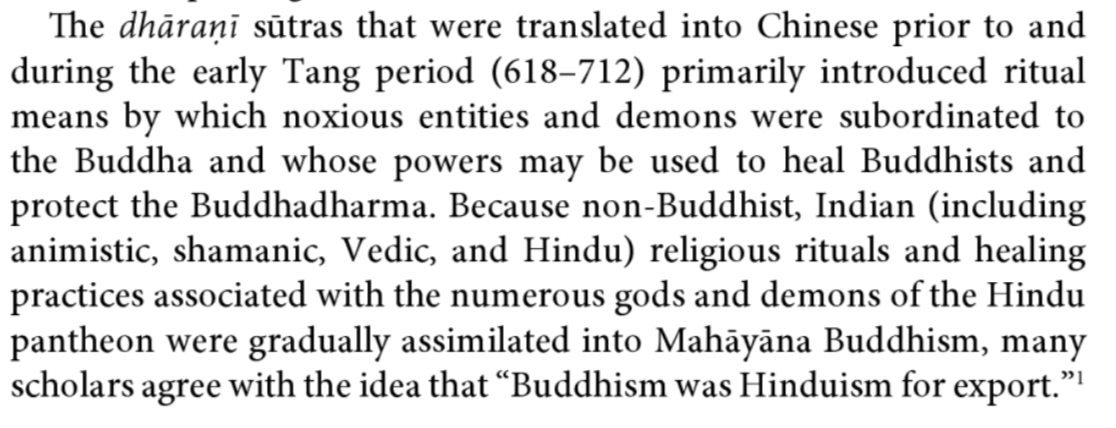If you look at "Hindu" deities in Japan like Saraswati (Benzaiten), these were "carried" by Buddhist monks and are, even today, revered by Buddhists.
This Hindu vs Buddhist split happens after colonialism and the Western "discovery" of Buddhism. https://www.booksfact.com/religions/japanese-goddess-benzaiten-saraswati.html">https://www.booksfact.com/religions...
This Hindu vs Buddhist split happens after colonialism and the Western "discovery" of Buddhism. https://www.booksfact.com/religions/japanese-goddess-benzaiten-saraswati.html">https://www.booksfact.com/religions...
Similarly, Saraswati is revered in Tibetan Buddhism as Yang Chen Ma.
"In Myanmar, Saraswati is named Thurathadi. In Thai literature too, the reference of Saraswati is seen. Again, the Goddess is worshipped as Yang Chen Ma, the goddess of music in Tibet." https://www.thestatesman.com/supplements/8thday/saraswati-beyond-myths-legends-1502736101.html">https://www.thestatesman.com/supplemen...
"In Myanmar, Saraswati is named Thurathadi. In Thai literature too, the reference of Saraswati is seen. Again, the Goddess is worshipped as Yang Chen Ma, the goddess of music in Tibet." https://www.thestatesman.com/supplements/8thday/saraswati-beyond-myths-legends-1502736101.html">https://www.thestatesman.com/supplemen...
Similarly in Thai "Buddhist" Temples you will find Ganesha at the entrance and also Shiva and Parvati.
People are "confused" at seeing "Hindu" deities. This confusion is *created* by colonial academic split of "Hindu"-"Buddhist", not based on reality. https://www.thaizer.com/culture-etiquette/ganesh-in-thailand/">https://www.thaizer.com/culture-e...
People are "confused" at seeing "Hindu" deities. This confusion is *created* by colonial academic split of "Hindu"-"Buddhist", not based on reality. https://www.thaizer.com/culture-etiquette/ganesh-in-thailand/">https://www.thaizer.com/culture-e...
"Buddhism" was monastic. "Shramans" and "Brahmins" is more a debate between monastic and householder paths. Shraman doesn& #39;t mean "Buddhist."
There is little evidence that "Buddhism" was ever a distinct householder path in India; rather it influenced mainstream Hindu practice.
There is little evidence that "Buddhism" was ever a distinct householder path in India; rather it influenced mainstream Hindu practice.
As has been noted, Buddhism was "Hinduism for export." It took Hindu thought & merged with cultural elements of wherever it went.
In India "Post-Buddha" Hinduism was Buddhist-Hinduism. It was Hindu cultural expression of Buddhism. Buddhism wasn& #39;t "uprooted", it simply merged.
In India "Post-Buddha" Hinduism was Buddhist-Hinduism. It was Hindu cultural expression of Buddhism. Buddhism wasn& #39;t "uprooted", it simply merged.
What of the "disappearance" of Buddhism in India? In householder expression it simply merged with Hindu practise and influenced it (rise of vegetarianism e.g.)
In monastic order, it maintained some distinction—its institutional expression was then wiped out by Islamic invasions.
In monastic order, it maintained some distinction—its institutional expression was then wiped out by Islamic invasions.
The study of Indian traditions after West& #39;s colonization is stuck with Abrahamic categories.
"Hinduism"/"Buddhism" are imagined as "religions" with conflict and conversion like Abrahamics have.
Why can& #39;t couldn& #39;t Indians be Hindu *and* Buddhist? http://sankrant.org/2003/02/need-i-belong-to-only-one-religion/">https://sankrant.org/2003/02/n...
"Hinduism"/"Buddhism" are imagined as "religions" with conflict and conversion like Abrahamics have.
Why can& #39;t couldn& #39;t Indians be Hindu *and* Buddhist? http://sankrant.org/2003/02/need-i-belong-to-only-one-religion/">https://sankrant.org/2003/02/n...
I can do Vipassana, revere Buddha and Krishna, read Gita, do yoga, learn a sufi dance, go to a temple and a church, what& #39;s the conflict?
Religious conflict comes from Abrahamic monotheism. "No gods besides me", "Only Jesus saves rest go to hell," these are the roots of conflict.
Religious conflict comes from Abrahamic monotheism. "No gods besides me", "Only Jesus saves rest go to hell," these are the roots of conflict.
Scholarship in the Western framework imposes the category of religion on India and then tries to map the various disputes as "religious conflict."
There was no religious conflict in India because there was no religion. All narratives of religious conflict are thus nonsense.
There was no religious conflict in India because there was no religion. All narratives of religious conflict are thus nonsense.
No I have not included Church in the category of Dharma. But *I* can go to a Church, and sometimes did when I was in India, without conflict.
It is only when I learnt in the US that Christians believed I was going to hell that conflict was experienced. https://abs.twimg.com/emoji/v2/... draggable="false" alt="😏" title="Grinsendes Gesicht" aria-label="Emoji: Grinsendes Gesicht"> https://twitter.com/aslibharat1/status/1287854634984333313?s=20">https://twitter.com/aslibhara...
https://abs.twimg.com/emoji/v2/... draggable="false" alt="😏" title="Grinsendes Gesicht" aria-label="Emoji: Grinsendes Gesicht"> https://twitter.com/aslibharat1/status/1287854634984333313?s=20">https://twitter.com/aslibhara...
It is only when I learnt in the US that Christians believed I was going to hell that conflict was experienced.
I am describing an experience. I am not prescribing it.
I am describing why Indians do it because they don& #39;t see a conflict. It is only when we realize the doctrines of the Church that we realize the conflict and incompatibility. https://twitter.com/BabrooWahen/status/1287918366854803458?s=20">https://twitter.com/BabrooWah...
I am describing why Indians do it because they don& #39;t see a conflict. It is only when we realize the doctrines of the Church that we realize the conflict and incompatibility. https://twitter.com/BabrooWahen/status/1287918366854803458?s=20">https://twitter.com/BabrooWah...
West "discovered" Buddhism "separate" from Hinduism in the 19th century. The "history" and discourse in India is based this Western lens All the neo-Buddhists, Left scholarship etc builds on those stereotypes where "Buddhism" was made into a "protestant" movement vs "Hinduism."
Nice list. https://twitter.com/19SunSunny/status/1213077938368737280?s=19">https://twitter.com/19SunSunn...
The Buddha is no "anti-caste" reformer. All evidence points to the contrary. Buddhism was an "upper caste" movement—most of Buddha& #39;s followers were Brahmins and Kshatriyas. Nowhere does he disavow the varna system, here he proclaims their superiority.
https://www.accesstoinsight.org/tipitaka/mn/mn.090.than.html">https://www.accesstoinsight.org/tipitaka/...
https://www.accesstoinsight.org/tipitaka/mn/mn.090.than.html">https://www.accesstoinsight.org/tipitaka/...
Just as Saraswati and Ganesha are revered in Japan, similarly in Thailand "Brahmins" preside over "Buddhist" rituals.
This is not "syncretic." Popular "Buddhism" was never a break from the Hindu continuum. Only fabricated Ambedkarite neo-Buddhism is. https://www.bangkokpost.com/learning/advanced/727080/brahmin-offerings-for-wealth-success">https://www.bangkokpost.com/learning/...
This is not "syncretic." Popular "Buddhism" was never a break from the Hindu continuum. Only fabricated Ambedkarite neo-Buddhism is. https://www.bangkokpost.com/learning/advanced/727080/brahmin-offerings-for-wealth-success">https://www.bangkokpost.com/learning/...

 Read on Twitter
Read on Twitter





